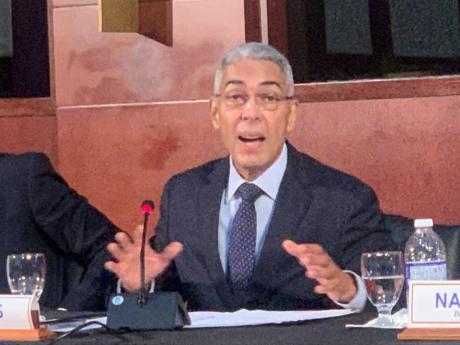BOJ laser focused on keeping inflation at projected level
Western Bureau:
Despite the multibillion-dollar hit Jamaica took from Hurricane Beryl, which did serious damage to various key sectors to include agriculture and tourism, the Bank of Jamaica (BOJ) says that while there will be an uptick in headline inflation over the next three to five months, it will be temporary.
“The decision to further ease the monetary policy stance reflects the committee’s (Bank’s Monetary Policy Committee) view that headline inflation is becoming more anchored in the bank’s target range of 4.0 to 6.0 per cent,” BOJ Governor Richard Byles told attendees during yesterday’s Bank of Jamaica Quarterly Monetary Policy Report press conference in Montego Bay, St James.
Byles had stated earlier that following meetings on August 16 and 19, the Bank’s Monetary Policy Committee announced a decision on Tuesday to continue the gradual easing of its monetary policy stance.
“Effective today, the 21st of August, the bank has reduced its policy rate by 25 basis points to 6.75 per cent. We will gradually reduce BOJ’s absorption of liquidity from deposit-taking institutions (DTIs) through our open-market operations and will continue to strive to preserve the stability in the foreign exchange market,” said Byles.
“Our previous decision, announced on the 24th of June 2024, to gradually reduce the absorption of liquidity, has already resulted in an injection of approximately J$21 billion into the system and a 105-basic point reduction in interest rates on BOJ’s 30-day Certificate of Deposit. As a consequence, Treasury Bill rates also fell over the same period.”
According to Byles, the Statistical Institute of Jamaica (STATIN) reported on August 15 that Jamaica’s annual headline inflation at July 2024 was 5.1 per cent, which was below the BOJ’s projections.
“This outturn was below the bank’s most recent forecast and represents the fifth consecutive month in which inflation fell within the bank’s target range. One measure of core inflation that excludes the price of agricultural food products and fuel prices from the CPI (Consumer Price Index) was 4.5 per cent at July 2024, representing a progressive lowering of underlying inflation since the start of 2024,” said Byles.
The central bank governor also spoke to the exchange depreciation, which, he said, has fallen appreciably as is being reflected in the pricings in financial markets as well as responses to survey questions.
“As a result, the dollarisation of deposits in commercial banks, or how much of these deposits are held in US dollars, has fallen noticeably over the past 25 months. At the current level of slightly less than 40 per cent, dollarisation is currently tracking below its pre-pandemic level,” said Byles. “The exchange rate has been fairly stable, depreciating by only 1.4 per cent on a year-over-year basis at August 12, 2024. The bank has maintained an appropriate presence in the foreign exchange market, which has supported the stability of the market. The surplus on the current account of the balance of payment for the December 2023 quarter, as well as the positive outlook for the balance of payment over the next year, underpins the relatively strong flow in the foreign exchange market and the relative stability in the exchange rate.”
The BOJ sold US$966 million via its B-FXITT (Bank of Jamaica Foreign Exchange Intervention Trading Tool) facility over the 12 months to end July 2024. When these sales are set against BOJ purchases, the result is the bank net purchased approximately US$1.3 billion over the period, resulting in net international reserves of US$5.1 billion at the end of July 2024,” added Byles.
As it relates to the recovery from the fallout caused by Hurricane Beryl, Byles said the risks to the inflation outlook are balanced, which means that inflation is likely to be in line with projections.
“Rising international shipping cost, worse than anticipated impact of Hurricane Beryl and other adverse weather conditions, could influence higher inflation. However, the factors than could result in lower-than-projected inflation include weaker-than-projected global growth, which could reduce domestic demand and imported inflation,” noted Byles.

